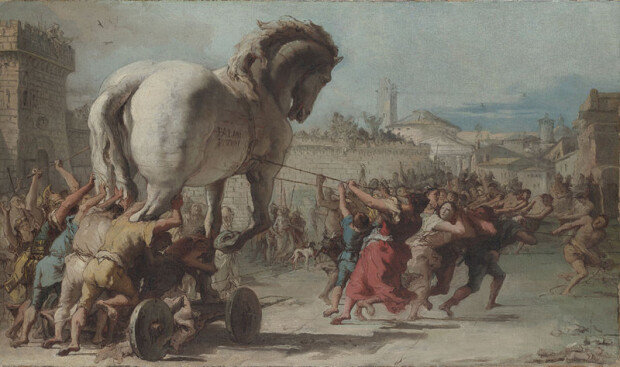Dullness and blind faith
Dullness and blind faith
Posted June. 13, 2024 09:40,
Updated June. 13, 2024 09:40

The Bible, mythology, and literature have long inspired painters. Giovanni Domenico Tiepolo, an 18th-century Italian artist, became widely celebrated for his vivid depictions of biblical and mythological stories. This painting depicts a scene from the legendary Trojan War in Greek mythology. Titled "Trojan Horse Procession Heading to Troy" (circa 1760), it vividly captures the moment the Trojans bring the infamous wooden horse into their city.
Tiepolo created this piece as a study for a larger oil painting, drawing inspiration from Virgil's "Aeneid." Uniquely, he depicted the wooden horse as if it were a real one, adding realism by meticulously detailing the texture of the muscles, mane, and tail. The scene shows the people of Troy leading an unrealistically large white horse into their city. On the left, sturdy soldiers and men push the horse from behind, while on the right, women and children pull it forward with ropes. Unaware that Greek soldiers are hidden inside the wooden horse, they consider it a divine gift and joyfully bring it into their city.
In the center, Tiepolo includes a small depiction of Cassandra, the daughter of the King of Troy, being arrested. Cassandra had warned that disaster would follow if the wooden horse entered the city. Similarly, the Trojan priest Laocoon, who also warned of the danger, met a terrible fate, entangled by a snake and dying along with his two sons. The artist inscribed the Latin phrase "PALADI VOTUM" on the side of the horse, referencing Pallas, the god of wisdom, courage, and war.
Unfortunately, the god of war was not on Troy's side. The Trojans lacked both wisdom and courage. Their king was foolish and dull, and the soldiers and citizens were blind to the truth. They suppressed those who spoke honestly and watched them die. Tiepolo's painting conveys a clear message: the foolishness of a leader and the blind faith of the people ultimately lead to a nation's downfall.






